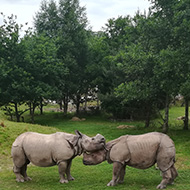Indian rhino calf born in Ireland

Shutterstock - Indian Rhinos at Fota Wildlife Park, Cork, Ireland.
A baby Indian rhino has been born at Fota Wildlife Park, in a first for Ireland.
Born to parents Maya and Jamil in September 2022, the rhino is the first Indian rhino to be born in Ireland, and the second of only three Indian rhino calves born at a zoological institution this year.
With only 3,300 Indian rhino living in the wild, the species is listed as vulnerable by the International Union for Conservation of Nature (IUCN), with the illegal trade of poaching posing the most significant threat.
Lead Ranger Aidan Rafferty commented on the exciting arrival: “Fota Wildlife Park is delighted to announce the first baby Indian rhino, hopefully, the first birth of many to come.
“Both mother and baby are doing really well. Maya is very protective and is constantly by his side.
“We’re delighted to see the little calf running around and playing. He is an absolutely gorgeous animal, and he’s getting stronger and more curious every day.”
With the new addition, Fota Wildlife Park is home to four Indian rhino – Maya and Jamil, a non-breeding male named Shusto, and the calf.
The one-horned Indian rhino was one widespread across parts of Asia, but population decimation meant that the species was close to extinction at the beginning of the 20th Century.
The global Indian rhino population is now concentrated in Assam province, India, where 85 per cent of the species reside.
Ireland's first Indian rhino calf is a welcome addition to the future of the species, and the as-yet-unnamed calf will be available for visitors to the Wildlife Park to view.



 The Veterinary Medicines Directorate (VMD) is inviting applications from veterinary students to attend a one-week extramural studies (EMS) placement in July 2026.
The Veterinary Medicines Directorate (VMD) is inviting applications from veterinary students to attend a one-week extramural studies (EMS) placement in July 2026.